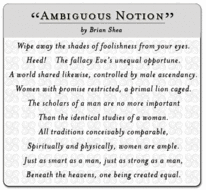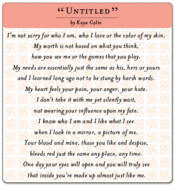By: Rebecca Zisch
When Sophomore Eryn Forrest enrolled in EDU 250: Foundations of Education this past spring, she was mostly  trying to complete a required class for her Elementary Education degree. From the course title, she thought that the class would focus on creating lesson plans and classroom management.
trying to complete a required class for her Elementary Education degree. From the course title, she thought that the class would focus on creating lesson plans and classroom management.
The class turned out to be something very different than what she originally expected. But it was different in a very good way.
Foundations of Education is described in the NSC catalog as an introduction to the philosophy, history, and sociology of modern education. Emphasis is placed on current trends in education. However, that is just the jumping off point for a course that deals with important issues of multiculturalism and social equity.
Forrest says, [t]he class made me think about things I’d never been asked to think about before it opened my eyes to so many different issues in education and across the country.
Dr. Kevin Graziano sees teaching this course as an opportunity to get students talking about different and often conflicting world views and how cultural influences and prejudices can affect the learning that goes on in a classroom. He says, they address heterosexism, classism, racism all of the isms we tackle these social issues in depth throughout the semester.
And all students were inspired to express their new understanding of these issues through the assigned final project: writing poetry.
While a poetry assignment may seem surprising in an Education course, Graziano advocates for incorporating different modes of learning and multiple intelligences to get students involved in their own teaching and learning.
Because of the multicultural nature of the curriculum, he doesn’t always rely on traditional forms of assessment like tests and essays. Instead he tries to infuse the arts and encourage the students to respond creatively to the course material. In past years, students have used other artistic expressions, this semester he accomplished this through the poetry writing assignment.
Some students simply wrote a heart-felt poem,
while others illuminated their expression with original artwork and collages that accompany the assignment. No matter, Graziano values all of the expression that his students are willing to put forth.
Seeing the outcome of what these students produce almost always exceeds my expectation for the assignment the poetry the students create demonstrates their understanding of so many subjects studied throughout the  semester, especially how they relate to education their own education and the education they are learning to facilitate for others.
semester, especially how they relate to education their own education and the education they are learning to facilitate for others.
It’s very emotional for some of the students to think about these issues, Graziano admits. When we discuss how socioeconomic class affects teaching and learning, it’s emotional for them to reflect their own personal experiences. And students who identify as gay or lesbian often reflect on the discrimination they’ve experienced at school and how that affected their learning experience.
For Forrest, the course, and especially the poetry assignment, inspired her to reflect on her strong opposition to racism. She grew up in Idaho near the headquarters of the Aryan Nation and was exposed to those kinds of racist beliefs during her childhood.
As an Elementary Education major, she also felt very troubled by issues of race, poverty and the clearly inadequate conditions of many public schools that were discussed in Graziano’s class. School is supposed to be a safe place, she said, but if it’s run-down and the teachers don’t want to be there than it isn’t a safe learning environment for the students.
Interestingly, Forrest is the first person in her family since her grandfather to graduate from high school and she will be the first person in her family ever to graduate from college. Her positive experiences in school led to her interest in becoming a teacher.
She wants to teach elementary school because I want to challenge my students to love to do what is expected of them and more children are eager to learn they want to learn, and I really love seeing the light bulbs go off for students when they really get something, And Forrest even had her own light bulb moments during Graziano’s class.
Teachers make the difference for students to stay in school and do well, Forrest asserts. Everybody is unique in their own way the class helped me realize that this is okay for my own identity, race or gender or whatever. So, it is okay for everyone. And knowing that will hopefully make me a better teacher it’s definitely made an impact already on how I do things.
For more information on Nevada State College, call : 702.990.2000 or visit : www.nsc.edu.
Student Poetry Reflects "Foundations of Education" and Much More
